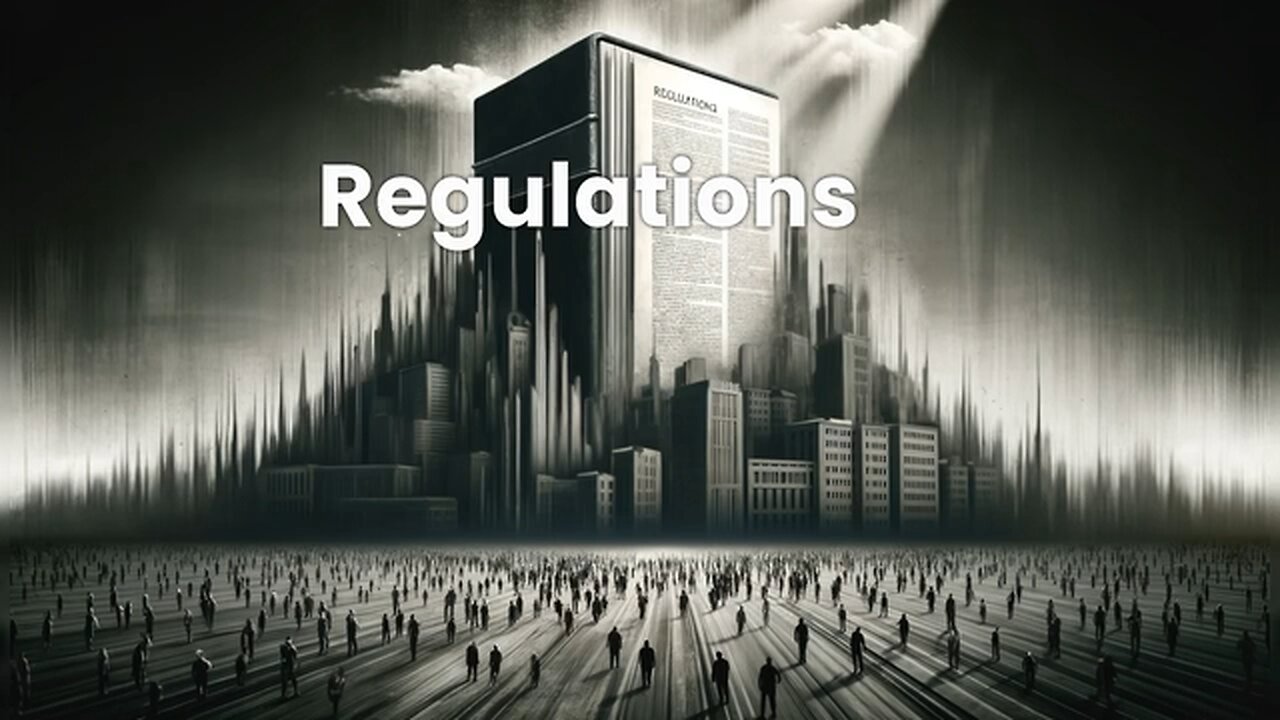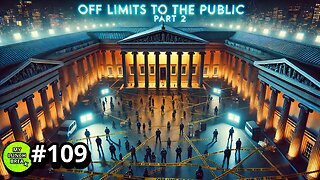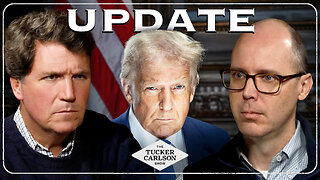Premium Only Content

In the modern era, the specter of regulation looms large, casting long shadows over...
In the modern era, the specter of regulation looms large, casting long shadows over the once bright promise of democratic engagement. Today's regulatory landscape is often shaped not in the halls of elected assemblies but in the secluded offices of bureaucrats. These regulators, while experts in their fields, are not accountable to the populace whose lives they drastically affect. The citizenry, stripped of their power to influence these unseen rule-makers, find themselves bound by laws and directives over which they have no control and no vote. This detachment from the democratic process fosters a growing sense of disenfranchisement and powerlessness among the people, eroding the very foundation of democratic governance.
This unchecked regulatory power manifests as a form of soft tyranny, subtle yet pervasive, infiltrating every facet of daily life. From the food we eat to the cars we drive, from the medicines we take to the energy we consume, there is scarcely an aspect of our existence that remains untouched by the cold hand of regulation. The individual's ability to make free choices is curtailed, replaced by a regulatory code that dictates compliance in exhaustive detail. As these regulations grow more complex and all-encompassing, the common citizen finds themselves navigating a labyrinthine bureaucracy that offers little escape or relief, breeding frustration and a pervasive sense of injustice.
Moreover, the absence of direct accountability has allowed regulatory bodies to expand their reach and power, often encroaching upon liberties with little to no public scrutiny. The opacity of this process only deepens public mistrust, as decisions that affect millions are made behind closed doors, guided by policy agendas that may not align with the public will. The democratic principle of governance "by the people, for the people" is thus hollowed out, leaving a shell of governance that serves the regulatory state more than it serves its citizens.
Economically, the impact of overregulation can be devastating. Small businesses, often lacking the resources to navigate complex regulatory frameworks, are disproportionately affected. Innovation stagnates under the weight of compliance costs and bureaucratic red tape, stifling economic growth and job creation. The broader economy, chained to the whims of regulatory shifts, experiences uncertainty and volatility, deterring investment and complicating financial stability. The very engines of economic progress are thus cooled by a regulatory chill that prioritizes control over creativity.
In sum, the unchecked expansion of regulatory power poses a grave threat to the principles of a free society. As regulations become more entrenched and detached from democratic oversight, they undermine the liberties and economic vitality of the nation. The vision of a free and open society, governed by the consent of the governed, fades into a dim memory, replaced by a regime that rules not through the power of the vote but through the imposition of regulations. In this environment, the voice of the individual grows faint, drowned out by the edicts of an unaccountable regulatory bureaucracy.
-
 4:45:11
4:45:11
MoFio23!
5 hours agoNintendo Switch It UP Saturdays with The Fellas: LIVE - Episode #3
13.9K3 -
 LIVE
LIVE
SquallRush
3 hours agoMarvel Rivals Collab
423 watching -
 8:36:24
8:36:24
stephengaming94
5 days agofar cry 5 live stream part 3
12.5K1 -
 2:03:28
2:03:28
Barry Cunningham
15 hours agoTRUMP DAILY BRIEFING: 2 DAYS TO GO - ARE YOU READY FOR HISTORY TO BE MADE?
40.7K59 -
 13:41
13:41
Tundra Tactical
7 hours ago $5.99 earnedGOA VP Erich Pratt Tells ATF "COMPLY NOW"
53K6 -
 21:06
21:06
BlackDiamondGunsandGear
8 hours agoPSA Micro Dagger Self-Destructs During Shooting! What Happened…
33K8 -
 6:27:09
6:27:09
Right Side Broadcasting Network
5 days agoLIVE REPLAY: RSBN Pre-Inauguration Coverage: Day Three in Washington D.C. - 1/18/25
268K57 -
 25:09
25:09
MYLUNCHBREAK CHANNEL PAGE
14 hours agoOff Limits to the Public - Pt 2
64.2K46 -
 1:36:11
1:36:11
Tucker Carlson
1 day agoSean Davis: Trump Shooting Update, & the Real Reason Congress Refuses to Investigate
348K411 -
 5:13
5:13
Russell Brand
2 days agoHost GRILLS Pzizer CEO Over Vaccine Efficacy
137K263